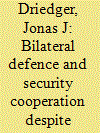|
|
|
Sort Order |
|
|
|
Items / Page
|
|
|
|
|
|
|
| Srl | Item |
| 1 |
ID:
177949


|
|
|
|
|
| Summary/Abstract |
With wavering US support and Brexit unfolding, cooperation between Germany, the EU's economic powerhouse, and the United Kingdom, Western Europe's prime military power, becomes crucial for Europe's overall ability to deal with a resurgent Russia. Does institutional and normative disintegration between states, such as the Brexit process, weaken bilateral security cooperation? This article argues that such cooperation persists if both states continue to jointly perceive a third actor as threatening while regarding each other as useful and reliable when it comes to ameliorating this shared threat. The argument is tested on a case of intrinsic theoretical, historical, and political importance: British-German cooperation towards Russia before and after the 2016 Brexit referendum. The article finds, against a wide pessimist consensus to the contrary, that cooperation strengthened during the Brexit process. As the Ukraine crisis had caused converging threat perceptions since 2014, Brexit incentivised both sides to signal ongoing reliability to each other and, consequently, to view each other as more capable allies. The article combines qualitative comparisons and congruence analysis, drawing data from British, German and Russian primary sources in their respective original languages, including foreign and security policy documents as well as interviews with stakeholders involved in policy formation.
|
|
|
|
|
|
|
|
|
|
|
|
|
|
|
|
| 2 |
ID:
189933


|
|
|
|
|
| Summary/Abstract |
Russia’s decision to invade Ukraine in early 2022 was seemingly driven by an unprecedented willingness to accept risks for the Russian regime, state, and society. Developing a generalizable framework, this article analyzes the development of Russian risk acceptance in offensive war initiation. Drawing on policy documents, speeches, expert literature, and various interviews with Russian, Ukrainian, and Western policymakers, the article finds that risk acceptance has continuously risen since the mid-2000s, although the 2022 invasion still evinces some risk aversion. These results are robust when accounting for miscalculation and caution against attributing the 2022 invasion solely to short-term and leader-centric factors. They also provide cues for understanding the crisis behavior of Russia and other major powers, corroborate prospect theory models on cognitive biases in elite decision-making, and indicate the need to revise the theoretical assumption that risk acceptance is an empirically rare and drastic aberration from a risk-neutral or risk-averse normality.
|
|
|
|
|
|
|
|
|
|
|
|
|
|
|
|
| 3 |
ID:
192529


|
|
|
|
|
| Summary/Abstract |
When Russia amassed troops in the winter of 2021–2022, many analysts deemed a large-scale invasion of Ukraine unlikely. Surveying the expert literature, we establish that these arguments largely relied on utility-based reasoning: Analysts thought an invasion was improbable, as it would foreseeably entail massive costs for Russia, its people, and its regime. We show that this regnant expert opinion had not sufficiently accounted for the Russian regime’s tendencies to increasingly accept risks, coupled with an inadequate processing of information on Ukrainian and Western views and policies. We argue that analysts miscalculated partially because the most prominent facts, long-term trends, and causal mechanisms available to them jointly suggested Russian cost-sensitivity, but provided only weak signs of countervailing factors. We thereby showcase that good forecasting requires explicit theory with a view on multiple interacting causal factors, area expertise and Socratic humility on the extent, context and certainty of our findings.
|
|
|
|
|
|
|
|
|
|
|
|
|
|
|
|
|
|
|
|
|